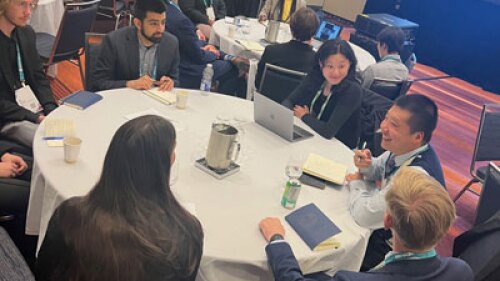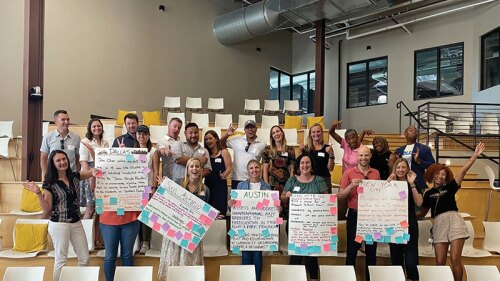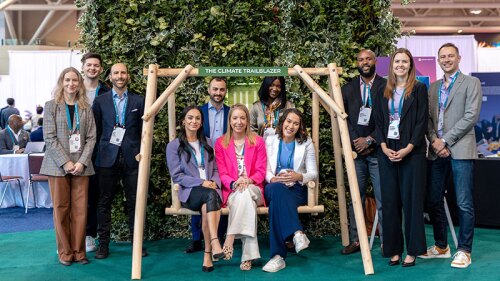Among the firms highlighted in ULI’s recent report Women in Leadership in the Real Estate and Land Use Industry for their exemplary records in promoting women, Gensler stands out for the sheer size and global nature of its workforce.
Employing more than 5,000 people in 46 offices in 16 countries around the world, Gensler places a premium on leveraging the diversity and expertise of its professionals to compete both in local markets and at an international scale. Differentiating itself as a “design thinking” firm—positioning design as a strategic tool to help clients achieve and exceed their business goals—Gensler serves companies representing a broad range of industry types and sectors and carries out assignments that range from workplace interiors to branding campaigns to skyscrapers in booming Asia megacities.
How does gender diversity fit into Gensler’s business model? Like the other firms profiled in the report, based on a survey by ULI’s Women’s Leadership Initiative (WLI), Gensler does not pursue the creation of opportunities for women as a policy in and of itself. Women succeed at Gensler due to a workplace culture that is inclusive of diverse points of view and that prizes good ideas and innovation above all else—all employed for the singular goal of serving clients, says Janine Pesci, the firm’s director of global talent.
This approach has been part of the firm’s DNA since Arthur Gensler founded it in San Francisco with his wife, Drucilla, in 1965. “Art set the tone very early on,” Pesci says. “The way we entered the marketplace was as an entrepreneurial organization. Our philosophy has been to hire the best people, get out of their way, and let them do their work.”
Gensler also takes a collaborative approach to leadership, assembling teams of people whose strengths are different and complementary. The foremost example of this is the position of chief executive officer, shared by Diane Hoskins, based in the Washington, D.C., office, and Andy Cohen, based in the Los Angeles office. Women are strongly represented in senior roles throughout the firm: 40 percent of Gensler’s board of directors is female, and of its office leaders, 37 percent are women. Several of its 31 practice areas are led by women, as well.
Removing Unconscious Bias and Cultivating Leaders
Though Gensler has not developed policies or programs that specifically target women for advancement, the company is aware of the influence unconscious biases have on hiring, promotion, and the awarding of plum assignments and greater responsibilities. Historically, such biases have led to the exclusion of women and minorities. Gensler has purposefully sought to level the playing field by giving all employees the opportunity to grow, learn, and reach their full potential.
To that end, Gensler offers a robust menu of training and leadership development programs that help employees acquire the technical, management, and strategic-thinking skills they need to succeed. These programs also help employees expand their capability to lead and collaborate across the firm’s global network. Each Gensler employee also has an individual development plan in which she or he is asked to articulate career goals and ambitions and determine how they align with Gensler’s corporate objectives.
“We want to create experiences where we are removing unconscious biases or where we are mitigating them as much as possible,” Pesci says.
Leadership training was, in fact, identified by respondents to the WLI survey as a particularly valuable approach companies can take to ensure that women advance in their careers.
The flagship of Gensler’s efforts is Gensler University (GU), founded in 1990 as a platform for companywide leadership development. GU offers more than 3,500 online and in-person courses that cover a variety of technical and soft skills, Pesci says. It also offers in-depth courses in project management and design excellence.
In addition, GU offers its midcareer professionals capstone experiences to prime them for future opportunities. Global Leaders is a competitive, six-month program that asks participants to explore what it means to be a leader within a global firm. The program takes place in four emerging markets within Gensler’s network and seeks applications from principals and senior associates with at least 13 years of experience.
Similarly, NextGen seeks companywide participation in a competitive application process for employees with seven to 12 years of experience. Participants collaborate and serve on six-person teams that work on a single project that aims to make a big impact on the entire firm. The Emerge program, a yearlong mentorship program between emerging account leaders and seasoned client account managers, began its life as a NextGen project.
The Emerge example illustrates Gensler’s emphasis on fostering innovation among its employees, encouraging them to take ownership of a problem and offer creative solutions. Gensler’s approach to cultivating leadership is not always about having a different job title, Pesci says, but about “stepping into an opportunity to own what you are doing. We’re developing leaders at every stage of their careers.”
Launching a New Practice Area
In 2010, several women leaders at Gensler realized that health and wellness was an area of expertise that Gensler did not explicitly offer to clients as a separate business line. “Although we had done a lot of health and wellness projects along the way, we had an opportunity to start thinking about a new business market,” says Sarah Bader, health and wellness practice area leader and a principal at the firm’s Chicago office. “It was a new proposition for Gensler.”
Along with colleagues in the Los Angeles office, including Nila Leiserowitz and Barbara Bouza, Bader proposed starting a new practice area focused on helping health systems think about ways design could help them deliver care more efficiently, more conveniently, and in a more personalized fashion—all mandates under the Affordable Care Act. The shift from acute or critical care to primary care and preventative care was also forcing health care providers to rethink their delivery models and space needs, Bader says.
“Although we didn’t have a deep portfolio in health, so much of what Gensler does is about creating place and focusing on the user experience,” says Leiserowitz, now managing principal of the company’s North Central region and based in the Chicago office. “I was in L.A. at the time, and I started to see health care clients coming to us. They knew we had a different perspective when it came to user experience and place making.”
Firms that focused exclusively on health care took a more siloed approach, Bader notes. “What is uniquely ‘Gensler’ is the ability to understand the strategic needs of clients and bring a lot of different market segments and experts to the project.” With 5,000 professionals in its network, Gensler offers a deep bench of expertise—from retail strategy to urban design to real estate analytics.
The health and wellness practice started with a project for Northwestern Memorial Hospital in Chicago which then opened the door to other work. Bader and her colleagues made the case to Gensler’s board and found a strong advocate in Hoskins, among others. “With starting a new practice comes the responsibility of being good at it,” Leiserowitz says. “[The firm’s leadership] trusted us. If we came to them with an ‘ask,’ they knew we had enough of a foundation to make it succeed. They believed in us. All three of us jumped in with our feet and bodies. It wasn’t any more complicated than that.”
Five years later, Gensler has billed $10 million in health care business and produced over 1 million square feet (93,000 sq m) of space for retail clinics, community health centers, hospitals, and other health care clients. The practice ranked 15 out of Interior Design magazine’s 40 health care giants for 2015.
The experience of Bader and others who began the health and wellness practice sums up what can happen when a firm places a high value on innovation and trusts its employees to deliver. That the players involved were women is not merely a happy coincidence: it is a reflection of Gensler’s commitment to setting each employee up for success.
“I feel lucky that I work for a firm that allowed me to start a smaller business within a larger business,” Bader says. “I was given the latitude, encouragement, and resources to do that. Any firm that empowers its employees to do that is a special place.”
To learn more, read the ULI case study on Gensler.
To read “Women in Leadership in the Real Estate and Land Use Industry,” go to womenincre.uli.org.




